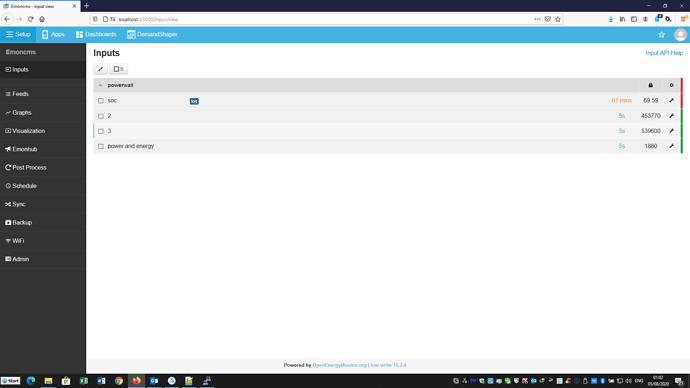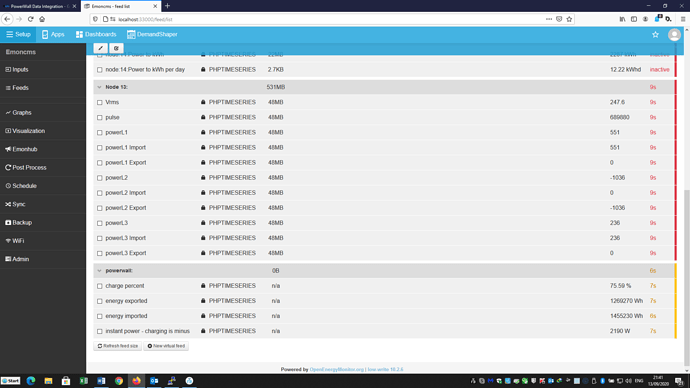Thx for yr suggestions in this thread …
To recap - I’m trying to adapt the published EmonHubTeslaPowerWallInterfacer.py so I can grab more data from another Tesla API – eg: battery instant power.
I have no Python expertise but mindful that an infinite number of chimps given an infinite amount of time could type The Bible, like a chimp I set to work. But after days spent on this, I’m now heartily sick of bananas. For example, it took me 2 days to discover that in Python to comment out a line it was necessary to use #space – who’d have thought that?
I finally settled on what I thought was a methodical approach. Below is a version of the original EmonHubTeslaPowerWallInterfacer.py with all the alternatives I can think of as comment lines – I could swap lines in/out easily using nano.
import time, json, Cargo, requests
from emonhub_interfacer import EmonHubInterfacer
"""class EmonHubTeslaPowerWallInterfacer
Fetch Tesla Power Wall state of charge
"""
class EmonHubTeslaPowerWallInterfacer(EmonHubInterfacer):
def __init__(self, name):
super().__init__(name)
self._settings.update(self._defaults)
# Interfacer specific settings
self._template_settings = {'name': 'powerwall',
'url': False,
'readinterval': 10.0}
# FIXME is there a good reason to reduce this from the default of 1000? If so, document it here.
# set an absolute upper limit for number of items to process per post
self._item_limit = 250
# Fetch first reading at one interval lengths time
self._last_time = 0
def read(self):
# Request Power Wall data at user specified interval
if time.time() - self._last_time >= self._settings['readinterval']:
self._last_time = time.time()
# If URL is set, fetch the SOC
if self._settings['url']:
# HTTP Request
try:
reply = requests.get(self._settings['url'], timeout=int(self._settings['readinterval']), verify=False)
# aggregates = requests.get(self._settings['url'], timeout=10, verify=False).json() # per @bwduncan
# aggregates = requests.get(self._settings['url'], timeout=10, verify=False) # per @bwduncan but no .json()
# reply = requests.get(self._settings['url'], timeout=10, verify=False).json() # per @bwduncan & reply
# reply = requests.get(self._settings['url'], timeout=10, verify=False) # per @bwduncan but no .json() & reply
reply.raise_for_status() # Raise an exception if status code isn't 200
except requests.exceptions.RequestException as ex:
self._log.warning("%s couldn't send to server: %s", self.name, ex)
jsonstr = reply.text.rstrip()
self._log.debug("%s Request response: %s", self.name, jsonstr)
# Decode JSON
try:
data = json.loads(jsonstr)
except Exception: # FIXME Too general exception
self._log.warning("%s Invalid JSON", self.name)
return
# Create cargo object
c = Cargo.new_cargo()
c.nodeid = self._settings['name']
c.names = ["soc"]
# c.realdata = [data['percentage']]
c.realdata = [data['battery']['instant_power']]
# c = Cargo.new_cargo(names=['battery_instant_power'], realdata=[aggregates['battery']['instant_power']) # per @bwduncan
# c = Cargo.new_cargo(names=['battery_instant_power'], realdata=[data['battery']['instant_power']) # per @bwduncan but data
# c = Cargo.new_cargo(names=['battery_instant_power'], realdata=[aggregates['battery']['instant_power']]) # added ]
return c
# return empty if not time
return
def set(self, **kwargs):
for key, setting in self._template_settings.items():
# Decide which setting value to use
if key in kwargs.keys():
setting = kwargs[key]
else:
setting = self._template_settings[key]
if key in self._settings and self._settings[key] == setting:
continue
elif key == 'readinterval':
self._log.info("Setting %s %s: %s", self.name, key, setting)
self._settings[key] = float(setting)
continue
elif key == 'name':
self._log.info("Setting %s %s: %s", self.name, key, setting)
self._settings[key] = setting
continue
elif key == 'url':
self._log.info("Setting %s %s: %s", self.name, key, setting)
self._settings[key] = setting
continue
else:
self._log.warning("'%s' is not valid for %s: %s", setting, self.name, key)
# include kwargs from parent
super().set(**kwargs)
But whatever alternative I’ve tried, I always got a popup error message and emonhub stopped (but could be restarted with … sudo systemctl start emonhub.service)
EmonCMS Error
-------------
Message: SyntaxError: unexpected token: identifier
Route: Lib/jquery-1.11.3.min.js
Line: 1
Column: 4
The emonhub log is not informative.
Then, quite by chance, I ran EmonHubTeslaPowerWallInterfacer.py as is but with a url containing /api/meters/aggregates
The log revealed the wealth of data that is available …
2020-07-31 23:12:48,043 DEBUG PowerWall PowerWall Request response: {"site":{"last_communication_time":"2020-07-31T23:12:47.889536541+01:00","instant_power":4.8070068359375,"instant_reactive_power":169.26604461669922,"instant_apparent_power":169.33428824341266,"frequency":49.95012283325195,"energy_exported":1101936.5047250446,"energy_imported":876557.3925028223,"instant_average_voltage":124.1665776570638,"instant_total_current":0,"i_a_current":0,"i_b_current":0,"i_c_current":0,"timeout":1500000000},"battery":{"last_communication_time":"2020-07-31T23:12:47.890245881+01:00","instant_power":2130,"instant_reactive_power":-20,"instant_apparent_power":2130.0938946440833,"frequency":49.969,"energy_exported":319410,"energy_imported":393570,"instant_average_voltage":248.33333333333334,"instant_total_current":-50.3,"i_a_current":0,"i_b_current":0,"i_c_current":0,"timeout":1500000000},"load":{"last_communication_time":"2020-07-31T23:12:47.889536541+01:00","instant_power":2147.7866236629907,"instant_reactive_power":151.9973041128399,"instant_apparent_power":2153.158275938683,"frequency":49.95012283325195,"energy_exported":0,"energy_imported":-299539.11222222226,"instant_average_voltage":124.1665776570638,"instant_total_current":17.297622791819002,"i_a_current":0,"i_b_current":0,"i_c_current":0,"timeout":1500000000},"solar":{"last_communication_time":"2020-07-31T23:12:47.890574865+01:00","instant_power":0,"instant_reactive_power":0,"instant_apparent_power":0,"frequency":0,"energy_exported":0,"energy_imported":0,"instant_average_voltage":0,"instant_total_current":0,"i_a_current":0,"i_b_current":0,"i_c_current":0,"timeout":1500000000}}
2020-07-31 23:12:48,044 WARNING PowerWall PowerWall Percentage key not found
And the warning – PowerWall Percentage key not found – suggests the code operated OK to that point. And emonhub continued to operate.
I’d more than welcome any further suggestions.
And I’m happy to be a testbed of any ideas suggested by those not having a PowerWall.
TIA

